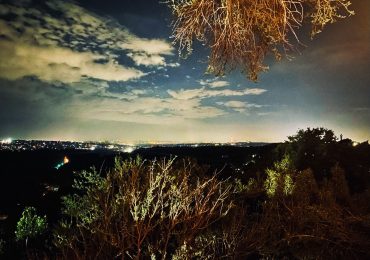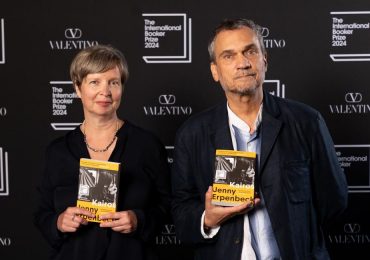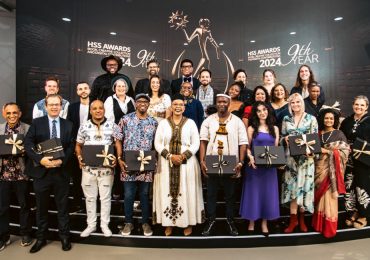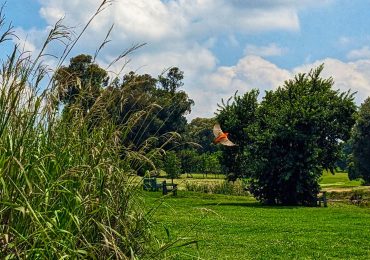South African author Damon Galgut has won the 2021 Booker Prize for Fiction for his novel The Promise.
The announcement was made this evening at a ceremony held at Broadcasting House in London, England, hosted by the BBC’s Samira Ahmed.
This was Galgut’s third Booker shortlisting: his novel The Good Doctor appeared on the 2003 shortlist, while In a Strange Room was shortlisted in 2010.
The Promise is Galgut’s ninth novel and his first in seven years; his debut was published when he was just seventeen. The fifty-seven-year-old author was the favourite to take the award this year according to the bookmakers, who placed The Promise at 2/1 to win.
Galgut alluded to his previous shortlistings in his acceptance speech, and paid tribute to his fellow African writers.
‘It’s taken a long while to get here, and now that I have I kind of feel that I shouldn’t be here,’ he said. ‘This could just have easily have gone to any of the other amazing, talented people on this list, and a few others who aren’t.
‘But seeing as the good fortune has fallen to me, let me say this has been a great year for African writing, and I’d like to accept this on behalf of all the stories told and untold, the writers heard and unheard, from the remarkable continent that I’m part of. Please keep listening to us: there’s a lot more to come.’
Galgut thanked his agent, his publishers and the Booker judges, saying: ‘It’s changed my life, and please know that I am really profoundly, humbly grateful for this.’
When asked how he felt about winning the prize, Galgut said: ‘You better ask me that tomorrow because my nerves have gone numb, I’m stunned, I truly didn’t expect to be standing here.’
In his discussion with Ahmed, Galgut spoke about the cinematic quality and structure of his novel, and one of the lead characters, Salome, who rarely speaks and has no narrated inner life.
‘It was a decision I took early on,’ he said. ‘I could have inhabited Salome’s thoughts in the way I did with the other characters, but I thought I made her silence and her absence, if you like—even though she’s present in the story—more powerful if I never went there. So I filled in the space around her, I guess. The point to be made, really, is that a woman like Salome, a rural, uneducated Black woman, is somebody even in the new South Africa who still has no voice and I wanted that to register as almost a physical fact.’
Galgut was also asked if it was important that the book was funny.
‘It’s important to me,’ he said. ‘In all the previous novels I keep getting told by critics that I have no sense of humour, which actually is not true, I find a lot of things very funny. So the particular narrative voice that I discovered for this book allowed me to give voice to some of my humour, which is certainly a dark humour but it’s funny nevertheless, at least to me, and I guess a few other people.’
First awarded in 1969, the £50,000 (about R1,053,000) Booker Prize is open to writers of any nationality, writing in English and published in the United Kingdom or Ireland.
Galgut becomes the third South African to receive the Booker, after JM Coetzee, who won twice, for The Life and Times of Michael K (1983) and Disgrace (1999), and Nadine Gordimer, who won in 1974 for The Conservationist.
Other Africans who have been awarded the prize include Nigerian author Ben Okri, who won in 1991 for The Famished Road, and British–Nigerian author Bernardine Evaristo, who won (jointly with Margaret Atwood) in 2019 for Girl, Woman, Other.
This year’s longlist included another South African, Karen Jennings, who was nominated for her book An Island.
Two African authors featured on the shortlist this year, for the second time in as many years: Galgut, and Somali–British author Nadifa Mohamed, for her novel The Fortune Men.
The other books on the shortlist this year were A Passage North by Anuk Arudpragasam, No One is Talking About This by Patricia Lockwood, Bewilderment by Richard Powers and Great Circle by Maggie Shipstead.
Chair of judges Maya Jasanoff described the judging process this year as ‘incredibly difficult’.
‘We discussed these books at length and every single one of these books had passionate support from us and we loved what they were doing,’ she said.
‘We arrived at a decision after a lot of discussion and arrived at a consensus around a book that is a real master of form and pushes the form in new ways, that has an incredible originality and fluidity of voice, and a book that’s really dense with historical and metaphorical significance.’
Jasanoff, who was joined on the 2021 judging panel by writer and editor Horatia Harrod; actor Natascha McElhone; twice Booker-shortlisted novelist and professor Chigozie Obioma; and writer and former Archbishop Rowan Williams, said: ‘The Promise astonished us from the outset as a penetrating and incredibly well-constructed account of a white South African family navigating the end of apartheid and its aftermath.’
She continued: ‘On each reading we felt that the book grew. With an almost deceptive narrative economy, it offers moving insights into generational divides; meditates on what makes a fulfilling life—and how to process death; and explores the capacious metaphorical implications of “promise” in relation to modern South Africa.
‘Galgut’s searching examination of family, place, and the dysfunctions that connect them reminded us of William Faulkner. His deft inhabiting of different characters’ consciousnesses evokes Virginia Woolf. All this he does with a sensibility, artistry, and scope that are entirely his own. As a spectacular demonstration of how the novel can make us see and think afresh, The Promise delivers. This is a book about legacies, those we inherit and those we leave, and in awarding it this year’s Booker Prize we hope it will resonate with readers in decades to come.’
Last year’s Booker Prize winner was Douglas Stuart, for his novel Shuggie Bain.





